‘Aham Brahmasmi’ encapsulates the essence of Vedanta philosophy
In the vast tapestry of Hindu philosophy, the principle of “Aham Brahmasmi” stands as a profound declaration encapsulating the essence of existence. This ancient Sanskrit phrase, often translated as “I am Brahman,” carries profound implications within the context of Vedanta, one of the six orthodox schools of Hindu philosophy. It is a declaration of identity, affirming the indivisible connection between the individual self (Atman) and the ultimate reality (Brahman). Let’s delve deeper into the meaning and significance of Aham Brahmasmi.
At its core, Vedanta explores the nature of reality and the individual’s relationship with it. It posits that the universe is an interconnected web of existence, and understanding this interconnectedness is crucial for realizing one’s true nature. Central to Vedanta is the concept of Brahman, the ultimate reality, which is formless, infinite, and beyond attributes. Brahman is the underlying substratum of the universe, the source from which all phenomena arise and into which they dissolve.
Conversely, each individual possesses an inner essence known as Atman, often translated as the “self” or the “soul.” Atman is not bound by the limitations of the body or mind; it is eternal, unchanging, and identical to Brahman in its essence. However, due to ignorance (avidya), individuals identify themselves with their bodies, minds, and egos, thereby experiencing a sense of separateness from the divine.
Herein lies the significance of Aham Brahmasmi. When one declares, “I am Brahman,” they are asserting the fundamental truth of their existence—that their true nature is divine and inseparable from the ultimate reality. It is a recognition of the underlying unity that pervades the cosmos, transcending the boundaries of individuality and ego.
The journey towards realizing Aham Brahmasmi is a central theme in Vedantic philosophy. It involves the process of self-inquiry (Atma-vichara) and spiritual practice (sadhana), aimed at transcending the limitations of the ego and realizing one’s innate divinity. Through meditation, introspection, and the study of sacred texts such as the Upanishads, aspirants seek to directly experience the unity of Atman and Brahman.
Moreover, the realization of Aham Brahmasmi brings about a profound shift in consciousness. It leads to the dissolution of the illusion of duality (dvaita) and the recognition of the underlying unity of all existence (advaita). This realisation is not merely intellectual but experiential, akin to the metaphorical tasting of honey rather than merely reading about its sweetness.
The significance of Aham Brahmasmi extends beyond the realm of philosophy; it has practical implications for daily life. When one recognizes the divine nature within themselves, they naturally extend that recognition to all beings, fostering a sense of compassion, empathy, and interconnectedness. This realisation serves as the foundation for a life lived in harmony with the universe, guided by principles of love, truth, and righteousness.
In conclusion, Aham Brahmasmi encapsulates the profound truth of Vedanta philosophy—that the individual self is not separate from the ultimate reality but is, in fact, identical to it. It is a declaration of oneness, unity, and divine identity. Through self-inquiry and spiritual practice, one can realize this truth and live a life in alignment with the eternal principles of Vedanta. As the ancient sages proclaimed, “Tat tvam asi”—”Thou art That.”
(Writer is a spiritual guide;views are personal)


























